|
|
|
Sort Order |
|
|
|
Items / Page
|
|
|
|
|
|
|
| Srl | Item |
| 1 |
ID:
173334
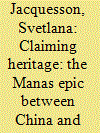

|
|
|
|
|
| Summary/Abstract |
In this article I argue that the renewed promotion of the Manas epic in Kyrgyzstan after 2010 should not be reduced to an attempt to consolidate a national identity or strengthen the state by endorsing ethno-nationalism. Instead, since the 2009 inscription of the Manas epic on the UNESCO List of Intangible Heritage by China, Kyrgyzstan has undertaken a full-scale heritagization not only of the Manas epic but also of its other tangible or intangible cultural assets. This heritagization has been shaped by an anxiety that Kyrgyzstan’s most valuable cultural asset might be appropriated by China. By shifting the focus from Manas as a potential national role model to the epic as national heritage, I suggest that Kyrgyzstan’s latest outburst of ‘Manasification’ is better understood as an attempt to resist China’s ongoing attempts to harness the heritage discourse in rewriting the cultural and historical narrative of Eurasia.
|
|
|
|
|
|
|
|
|
|
|
|
|
|
|
|
| 2 |
ID:
173333
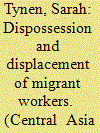

|
|
|
|
|
| Summary/Abstract |
The media often focuses on the visible aspects of state violence. However, the invisible aspects of everyday struggle often go under-reported. How does dispossession and displacement occur for Uyghurs in Xinjiang? What is the role of their dispossession in securing state territorial control? Some Uyghurs from rural areas in Xinjiang, China have experienced a triple dispossession: displacement from the countryside, alienation in the city, and eviction from the city. The stories concern the agony people feel as they move from rural to urban settings and back again, pain caused by severe hardship in the economic, political and cultural senses. This case shows how economic development works together with interventionist state power to violently dispossess and displace the most vulnerable poor minorities from their homes and livelihoods.
|
|
|
|
|
|
|
|
|
|
|
|
|
|
|
|
| 3 |
ID:
173335
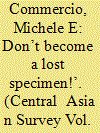

|
|
|
|
|
| Summary/Abstract |
Why would a woman agree to wed a legally married man when the state would neither recognize her marriage nor grant her alimony, child support or inheritance rights? Although the Communist Party curtailed the rate of openly acknowledged polygynous marriages among the Kyrgyz, its work was undone by glasnost and perestroika, which ushered in a permissive environment. This article highlights constructions of gender as a driver of polygyny in Kyrgyzstan from the perspective of women who voluntarily become second wives. The Kyrgyz case suggests that the cultural value of marriage and motherhood – traditions that grant women communal identities, power and prestige – might lead a woman to consent to second-wife status. I employ the concept of motivational interconnectivity, defined as two or more related reasons women make important personal decisions that have societal repercussions, to explain a woman’s decision to become a second wife.
|
|
|
|
|
|
|
|
|
|
|
|
|
|
|
|
| 4 |
ID:
173332
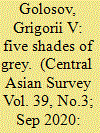

|
|
|
|
|
| Summary/Abstract |
This article overviews and seeks to explain the processes of party system formation in the post-Soviet Central Asian states (Kazakhstan, Kyrgyzstan, Tajikistan, Turkmenistan and Uzbekistan) by focusing on a crucial party-system property, fragmentation. The analysis reveals that to a much greater extent than in democracies, where party systems are largely shaped by societal factors, the level of party system fragmentation in autocracies is determined by the scope of presidential powers, as entrenched in the formal institutional order and reflected in the national constitution. The level of authoritarianism is largely inconsequential for party system fragmentation, while the role of electoral rules is secondary. Institutionally weak and institutionally strong autocratic presidents have a preference for fragmented party systems, while presidents with an intermediate range of powers seek and obtain low levels of party system fragmentation.
|
|
|
|
|
|
|
|
|
|
|
|
|
|
|
|
| 5 |
ID:
173339
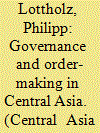

|
|
|
|
|
| Summary/Abstract |
This forum brings together five different angles on the question as to whether and how political regimes and forms of order-making can and should be researched through the concept of ‘illiberalism’. The discussion engages critically with this and associated concepts, such as ‘illiberal peace’ and ‘authoritarian conflict management’, which have been developed out of the Central Asian / Eurasian context and discussed in their wider global ramifications and, within the framing of ‘illiberal peace’, explored in various contexts in and beyond Central Asia. While further assessing the relevance and implications of this approach, this forum also attempts to think beyond ‘illiberalism’ by introducing and discussing the idea of ‘post-liberalism’. This way, the authors engage in an exchange that serves to probe both concepts and to determine their strengths and limitations when it comes to analysing and understanding politics and societal processes in Central Asia.
|
|
|
|
|
|
|
|
|
|
|
|
|
|
|
|
| 6 |
ID:
173336


|
|
|
|
|
| Summary/Abstract |
Mongolia's transition to a democratic, market economy has created widespread change, especially among pastoral herders. Pastoralists have been depicted as archaic and independent ‘nomads’ who exist outside the modern economy. Still, pastoral culture is a key asset in tourism products and advertising. Tourism could provide fair economic benefits, but inclusive growth depends on how shareholders participate. Using interviews with tour company employees, I investigate how tour companies incorporate pastoralists into their products. The results demonstrate several barriers to inclusive growth. Companies feel individually responsible for managing tourism assets, and to maintain the guise of pastoral authenticity, they limit pastoralists’ participation in business through informal and contingent work contracts. These contracts reveal problematic asymmetry and give pastoralists little job security, control, or access to employee benefits. These circumstances oppose inclusive growth paradigms and demonstrate elements of precarious work. The shared interest in maintaining pastoral culture may unify this fragmented industry.
|
|
|
|
|
|
|
|
|
|
|
|
|
|
|
|
| 7 |
ID:
173338
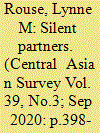

|
|
|
|
|
| Summary/Abstract |
Civilizations are as complex as the human relationships that engendered them, and outlining these relational qualities within open notions of mobility and interaction frames a reconceptualization of Central Asia’s past. Recent Eurasian archaeological research deconstructs deterministic political-economic or hierarchical typologies of civilization and the overly simplified narrative that roots it in urban centres perpetually juxtaposed with nomadic groups. Archaeological evidence from the Oxus Civilization, Central Asia’s earliest complex polity (ca. 2500–1400 BCE), reveals the deep roots of sedentary–mobile interactions. I argue that Oxus–steppe relationships helped maintain the long-term structural cohesion of the Oxus Civilization as a multicultural entity, with implications for subsequent Central Asian polities. As we begin to balance the lopsided conversations about the social formations of Central Asia’s past and present, the silent partnership that characterized the Oxus Civilization is given a voice that forces us to reconsider who, exactly, belongs inside our notions of civilization.
|
|
|
|
|
|
|
|
|
|
|
|
|
|
|
|
| 8 |
ID:
173337


|
|
|
|
|
| Summary/Abstract |
In this article, we empirically examine how the Central Asian states apply external regime legitimation strategies to legitimize their regimes domestically. We used the Central Asia Watch Project’s data from five Central Asian state-run media outlets to examine spatial and temporal changes in regime legitimation strategies. All the Central Asian countries employed external regime legitimation strategies, but those strategies differ based on regime type. Overall, we see continuity and persistence in reporting regional cooperation but underreporting of regional conflict throughout the 2016–2017 timeframe of this study.
|
|
|
|
|
|
|
|
|
|
|
|
|
|
|
|
|
|
|
|
|